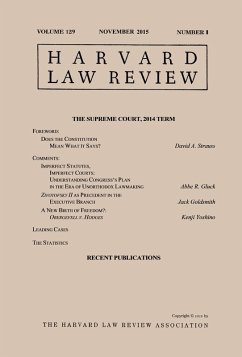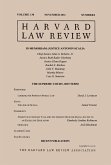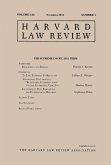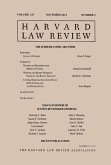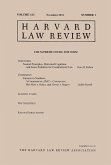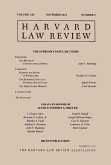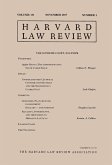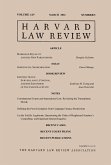* Foreword: "Does the Constitution Mean What It Says?," by David A. Strauss
* Comment: "Imperfect Statutes, Imperfect Courts: Understanding Congress's Plan in the Era of Unorthodox Lawmaking," by Abbe R. Gluck
* Comment: "Zivotofsky II as Precedent in the Executive Branch," by Jack Goldsmith
* Comment: "A New Birth of Freedom?: Obergefell v. Hodges," by Kenji Yoshino
In addition, the first issue of each new volume provides an extensive summary of the important cases of the previous Supreme Court docket, covering a wide range of legal, political, and constitutional subjects. Student commentary on Leading Cases of the 2014 Term includes recent cases on: private rights of action and Medicaid; government speech under the First Amendment; judicial campaign speech; Fourth Amendment standing; reasonable mistakes of law for searches and seizure; regulatory takings under the Fifth Amendment; preliminary injunctions in death penalty cases; separation of powers in bankruptcy jurisdiction; legislative control of redistricting; racial gerrymandering under the Fourteenth Amendment; dormant commerce clause and personal income tax; changing interpretive rules in administrative law; residual clause of the Armed Career Criminal Act; cost-benefit analysis under the Clean Air Act; mens rea for violating federal threats law; disparate impact and racial equality in fair housing law; nondelegation doctrine in the context of railroad-passenger law; religious liberty and land use; Sherman Act state action immunity; and destruction of evidence under Sarbanes-Oxley.
Complete statistical graphs and tables of the Court's actions and results during the Term are included; these summaries and statistics, including voting patterns of individual justices, have been considered very useful to scholars of the Court in law and political science. The issue includes a linked Table of Cases and citations for the opinions. Finally, the issue features two summaries of Recent Publications.
The Harvard Law Review is offered in a quality digital edition, featuring active Contents, linked footnotes, active URLs, legible tables, and proper ebook and Bluebook formatting. This current issue of the Review is November 2015, the first issue of academic year 2015-2016 (Volume 129). The Review is a student-run organization whose primary purpose is to publish a journal of legal scholarship. It comes out monthly from November through June and has roughly 2500 pages per volume. Student editors make all editorial and organizational decisions.
Dieser Download kann aus rechtlichen Gründen nur mit Rechnungsadresse in A, B, CY, CZ, D, DK, EW, E, FIN, F, GR, H, IRL, I, LT, L, LR, M, NL, PL, P, R, S, SLO, SK ausgeliefert werden.

